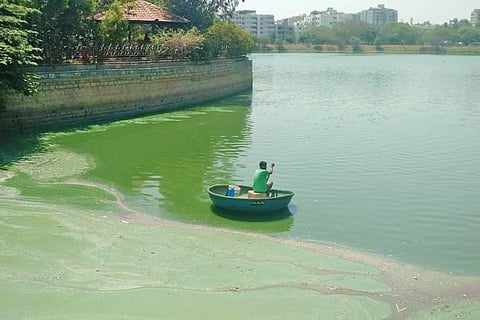

The Kaikondrahalli lake in Bengaluru has seen algal bloom developing on its surface for the last three years and the problem has remained unsolved till now. Residents allege that since 2016, a private landowner allegedly cut through the lake bund and has been letting sewage water into the lake through the eastern side, which has led to the blooming of algae and degeneration of the lake. They added that authorities have failed to take any action.
The residents say that the landowner allegedly encroached upon the lake’s buffer zone as well, and added that the local police refused to register a complaint against him. Birds have also started dying due to the worsening condition of the lake caused by the algae bloom, the residents have alleged.
A dead bird in Kaikondrahalli Lake
Mahadevapura Parisara Samrakshane Mattu Abhivrudhi Samiti (MAPSAS), a citizens’ group, was looking after the lake along with officials from the Bruhat Bengaluru Mahanagara Palike’s (BBMP) Lakes Department. On their Facebook page, they posted photos of the algae formation and wrote that this has been a recurring issue.
“The lake water, during every summer since 2018, has had green scum formation and stink that had to be tackled by spraying bio-enzyme and tossing bokashi balls (made with sawdust, red soil, cow dung, jaggery). These were just stopgap solutions till rains come and 'dilute' the raw sewage and 'wash' the green scum down the lake chain,” they wrote.
Subramaniam Sankaran of MAPSAS alleged that the landowner had set up shanties, where garbage was dumped and burnt, which also burnt parts of the lake foliage along the fence. The sewage water from nearby settlements, including effluents from the Parapana Agrahara jail, also allegedly goes into the lake. The sewage comes through a stormwater drain which is supposed to carry fresh stormwater, he said.
“We approached the BBMP Lakes Department to communicate with other agencies like Karnataka State Pollution Control Board. However, no action was taken in spite of having necessary approvals and the pandemic delayed the same,” Subramaniam alleged. He further said that they have been pressuring the BBMP Lakes team to provide long-term relief in the form of an underground drainage system (UGD), which could divert sewage water from the lake but in vain.
Subramaniam said that they had approached the National Green Tribunal (NGT) in March 2019 following which authorities were asked to submit a report pertaining to the lake. “The two reports that were submitted in NGT were as different as chalk and cheese. The problem has been persisting due to poor inter-agency communication. The Bangalore Water Supply and Sewerage Board (BWSSB) has not provided a uniform drainage system across the city which has majorly contributed to the degradation of the lakes,” he alleged. The case is coming up for hearing again in April 2021.
When TNM contacted the chief engineer of BBMP Lakes, Mohankrishna BT, he denied that the sewage water was mixing with the lake water. “After visiting the lake on Thursday, we observed that sewage water is not mixing with the lake water. However, the diversion we created is not sufficient and the department will be working on creating a bigger diversion that will be able to hold the sewage water from going into the lake. We have also put enzymes in the lake to treat it. Meanwhile, plans are underway to create a sewage treatment plant nearby and work for both — the diversion and the STP — will begin in a couple of months and will be completed within a year,” Mohankrishna said.